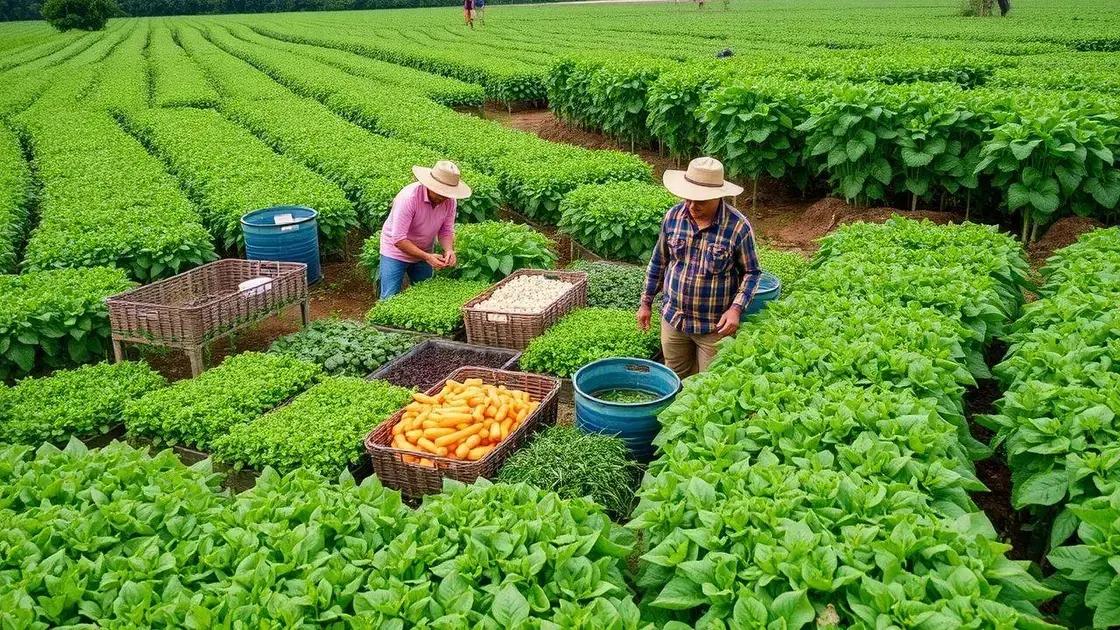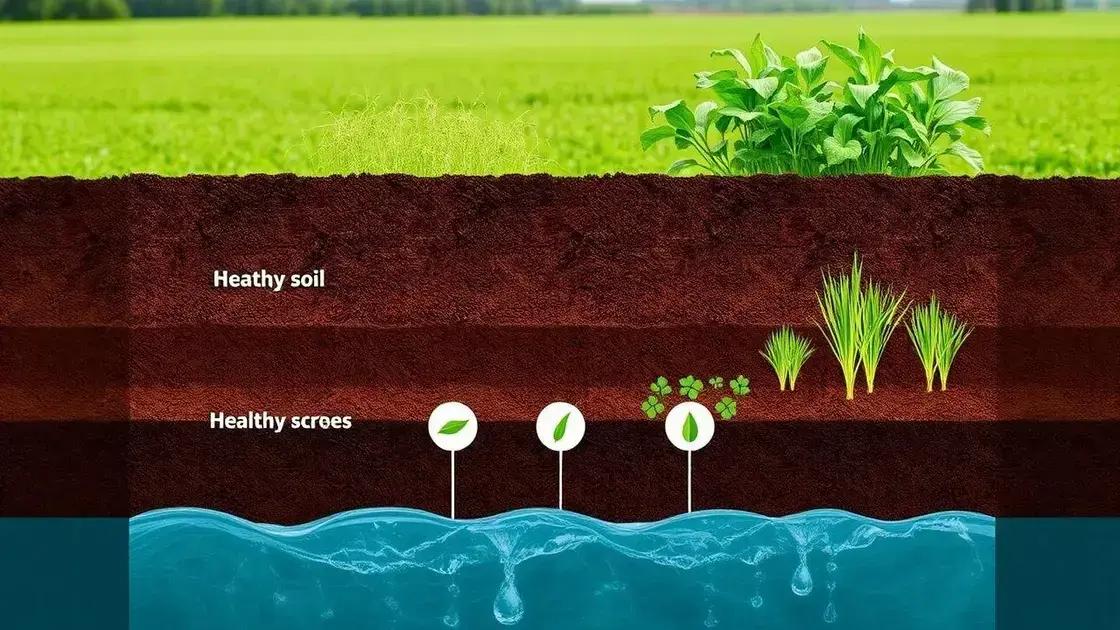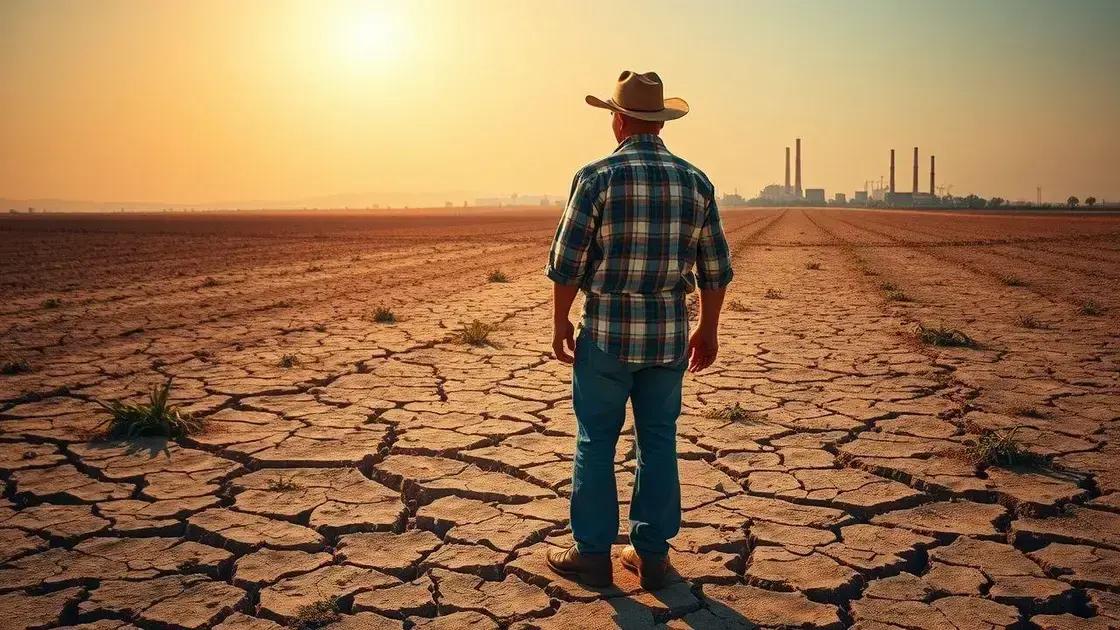U.S. joins global initiative for sustainable agriculture

The U.S. joins a global initiative for sustainable agriculture by investing in research, facilitating partnerships, and implementing supportive policies while addressing challenges such as market resistance and financial constraints.
The U.S. joins a global initiative for sustainable agriculture, making strides towards environmentally friendly farming while addressing climate change. Have you considered how these changes impact local farmers and global food security?
Understanding the global initiative for sustainable agriculture
The global initiative for sustainable agriculture aims to transform farming practices worldwide. By focusing on methods that preserve resources while enhancing crop yield, this initiative creates a pathway for both farmers and the environment. Understanding the core principles of this initiative is crucial for anyone interested in the future of food production.
What Is Sustainable Agriculture?
Sustainable agriculture encompasses various farming techniques designed to maintain healthy ecosystems while producing food. It emphasizes practices that minimize environmental impact and conserve resources. This includes methods such as crop rotation, organic farming, and the use of renewable energy sources.
Key Principles of the Initiative
One of the fundamental aspects of the global initiative is creating a balance between the economic viability of farms and ecological health. Sustainable practices protect soil quality, enhance biodiversity, and reduce chemical inputs.
- Conservation of water and soil resources
- Reduction of greenhouse gas emissions
- Promotion of local food systems
- Enhancement of farm resilience to climate change
By adopting these principles, farmers can significantly impact their local environments while ensuring food security for future generations. Educating farmers about these practices is an essential aspect of the initiative.
The Role of Collaboration
Collaboration between governments, NGOs, and the agricultural sector is vital in this initiative. Through shared knowledge and resources, stakeholders can effectively tackle challenges related to sustainable agriculture. This includes sharing research findings, funding new projects, and offering training programs for farmers.
By working together, they can create innovative solutions that not only address current agricultural challenges but also ensure long-term sustainability.
Key benefits of sustainable agricultural practices

Sustainable agricultural practices offer numerous benefits that extend beyond the farm. These methods not only enhance food production but also promote environmental health.
Improved Soil Health
One significant advantage of sustainable agriculture is improved soil quality. Using practices that minimize chemical use helps maintain soil fertility and structure. Crop rotation and cover crops contribute to nutrient-rich soils.
- Enhances water retention
- Reduces soil erosion
- Promotes beneficial microbes
- Encourages biodiversity
These benefits create a solid foundation for long-term agricultural success and increased productivity.
Better Water Conservation
Water conservation is critical in sustainable practices. Techniques like drip irrigation and rainwater harvesting help reduce water waste. This not only preserves a vital resource but also lowers costs for farmers.
By optimizing water usage, farms can enhance resilience to drought and climate changes. This approach contributes to overall sustainability, ensuring that farmers can continue to produce food despite varying weather patterns.
Reduction of Carbon Footprint
Another major benefit of sustainable agriculture is the reduction of the carbon footprint associated with food production. By minimizing reliance on synthetic fertilizers and pesticides, farms can decrease greenhouse gas emissions. Practices such as organic farming and agroforestry promote carbon sequestration, which positively impacts the atmosphere.
This proactive stance helps mitigate climate change while fostering a healthier planet for future generations. As more farmers adopt these practices, the collective impact on environmental health becomes increasingly significant.
How the U.S. is contributing
The U.S. plays a vital role in promoting sustainable agriculture both domestically and globally. By investing in research, facilitating partnerships, and implementing policies, the U.S. helps shape the future of agricultural practices.
Investing in Research and Development
One of the main ways the U.S. contributes is through significant funding for agricultural research. This includes developing new technologies that enhance crop resilience and reduce environmental impact.
- Support for biotechnology that improves drought resistance
- Research on organic farming techniques
- Innovations in pest management
- Development of sustainable irrigation methods
These efforts ensure that farmers have access to effective tools for sustainable practices, increasing productivity while protecting natural resources.
Facilitating Partnerships and Collaboration
The U.S. also fosters collaborations between governmental agencies, universities, and private sectors. These partnerships create platforms for knowledge sharing and innovation in sustainable agriculture.
For example, initiatives promoting farmer cooperatives help small farmers access resources they might not have individually. This support encourages community-based solutions to agricultural challenges, making farming more sustainable.
Implementing Supportive Policies
U.S. policies dedicated to sustainability further contribute to these practices. Programs encouraging conservation of natural resources, as well as subsidies for adopting sustainable practices, are essential.
These policies motivate farmers to shift towards more eco-friendly methods, providing financial assistance to those who invest in sustainable technologies. Additionally, the U.S. engages in international agreements to promote sustainable agriculture worldwide, fostering a global commitment to food security and environmental health.
Challenges faced by the initiative

The initiative for sustainable agriculture faces several challenges that can hinder its progress. Addressing these challenges is crucial for the success of the initiative.
Market Resistance
One major challenge is market resistance. Many traditional farming methods are deeply rooted in agriculture. This can make farmers hesitant to adopt new practices, even when the benefits are clear.
- Price competition with conventional products
- Lack of knowledge about sustainable practices
- Concern over initial investment costs
- Limited access to sustainable products and resources
These factors can create barriers that slow down the transition to more sustainable methods.
Policy and Regulatory Issues
Another significant hurdle involves policy and regulatory frameworks. Many farmers rely on existing subsidies and regulations that favor traditional farming. Changing these laws can be a slow process.
In addition, inconsistent regulations across states can create confusion for farmers who want to adopt sustainable agriculture practices. Clear and supportive policies are essential, but they often take time to implement.
Environmental Factors
Environmental challenges also play a role. Climate change continues to impact weather patterns, making it difficult for farmers to plan effectively. Natural disasters, such as droughts and floods, can destroy crops and disrupt farming.
The unpredictability of the climate can deter farmers from investing in sustainable practices. Without reliable weather conditions, the perceived risk of switching methods can lead to reluctance among farmers.
Financial Constraints
Lastly, financial constraints often affect the implementation of sustainable practices. Many small farmers operate on tight budgets and may lack the funds to invest in new technologies or methods.
Access to credit is vital, but securing loans can be challenging. Without financial support, farmers may struggle to make the necessary changes for sustainability.
FAQ – Frequently Asked Questions about Sustainable Agriculture
What is sustainable agriculture?
Sustainable agriculture focuses on farming methods that maintain environmental health, enhance soil quality, and promote biodiversity while producing food.
How is the U.S. contributing to sustainable agriculture?
The U.S. contributes through research funding, collaboration with farmers, and supportive policies that encourage sustainable practices.
What challenges does sustainable agriculture face?
Challenges include market resistance, regulatory issues, financial constraints, and environmental factors that can hinder the adoption of new practices.
Why is sustainable agriculture important?
It is important because it supports food security, conserves natural resources, and helps combat climate change, ensuring a healthier planet for future generations.





